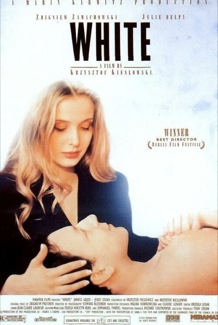
When I wrote about the first part of this trilogy, I mentioned how each film corresponds with a colour of the French national flag but didn’t talk about how each colour also corresponds with one of the values of the French national motto. In the case of Bleu, I found its interpretation of liberty in a personal sense to be interesting but not especially insightful. In the case of Blanc, it is impossible to see it as anything other than an explicit attempt at the restoration of equality.
Unlike Bleu which took place entirely in Paris, Blanc is predominantly set in Poland. Some early scenes in France establish how the marriage between Zbigniew Zamachowski’s Karol Karol and Julie Delpy’s Dominique Vidal has failed. The Polish Karol has his manhood all but eviscerated when he is forced to admit in court that he has suffered from erectile dysfunction ever since the wedding and the judge grants this as sufficient grounds for a divorce. To top it off, Vidal uses a dirty trick to steal the beauty salon that they jointly operate, leaving him nothing but a 2 franc coin. In case we don’t get that Karol is totally down on his luck, a passing pigeon even craps on him when he stops to admire it.
But fear not because a passing fellow Pole soon smuggles Karol back home where he finds his footing. In fact, he does more than that. Through an implausible series of events, he ends up being filthy rich. Of course, he has forgotten neither his passion for Vidal nor the humiliation he suffered at her hands so he deploys his newfound wealth in an elaborate scheme to gain revenge. With his pride restored, he has no problems getting it up as he is more than happy to demonstrate to his ex-wife who shows how impressed she is through her loud orgasms. Equality achieved!
As you can probably tell, I am not pleased with this film. Begin with how shockingly crass and hamfisted it feels, compared with the quiet subtlety of Blue. Kieślowski resorts to cartoon levels of caricature to demonstrate Vidal’s vileness and Karol’s despondency. Whatever Zamachowski’s other merits as an actor may be, he never makes the psychological turn from pushover to devious capitalist believable in the least. As for the character of Vidal, the doe-eyed portrayal by Delpy and how she constantly looks like she’s on the verge of breaking down and taking him back is at odds with how manipulative she supposedly is.
The worst thing about this movie is that it basically amounts to an adolescent revenge fantasy that everyone has imagined at one point or another and then quickly grown out of. It’s one thing to use this material for a serious film but to actually allow Karol succeed in his scheme feels stupidly juvenile. That Vidal ends up sexually submitting to Karol just rams home how petty this exercise is. Even the thematic link to the color white feels weak. The snow-covered landscapes of Poland are all right I suppose but a literal orgasmic white-out? How drole of you, Mr. Kieślowski!
I get that there are metaphorical allusions galore in here. Karol represents the country of Poland itself, which sends its people to work in the rich economies of Western Europe and are mistreated, where the end of communism has brought only a cut-throat brand of capitalism in which only criminals or the unethical can get ahead. Vidal is Western Europe as a whole, well off, cultured and beautiful but also arrogant and cruel. See how Karol is mocked for not speaking French well so he makes an extra effort to learn it, but Vidal has to rely on a translator while in Poland like a stupid, rich Western tourist. I can appreciate Zamachowski’s attempt to incorporate a larger message here but I still deplore how overtly political it feels and how clumsily he executes it.
Reading on the Internet, I discovered that the final scene was filmed months after the rest of movie had already been completed. Apparently Kieślowski was worried that audiences would hate the character of Vidal too much and wanted to soften her personality. To me, this is indicative of the wide gulf between what he intended to convey and what audiences actually see because Vidal’s actions in no way justified the enormity of the revenge Karol enacted. Karol may be a hero to the MRA crowd but he’s a petty and vindictive shitheel in my book.
The only saving graces this film has are the interesting cinematography and the rustic scenes of the Polish countryside. I also can’t deny being amused by the dark humor in this absurd scenario. But it’s not worth putting up with what is not just a bad plot, but an offensively bad one. At least this is the lowest rated entry of the trilogy so I can still hope that the final part of the trilogy is good.